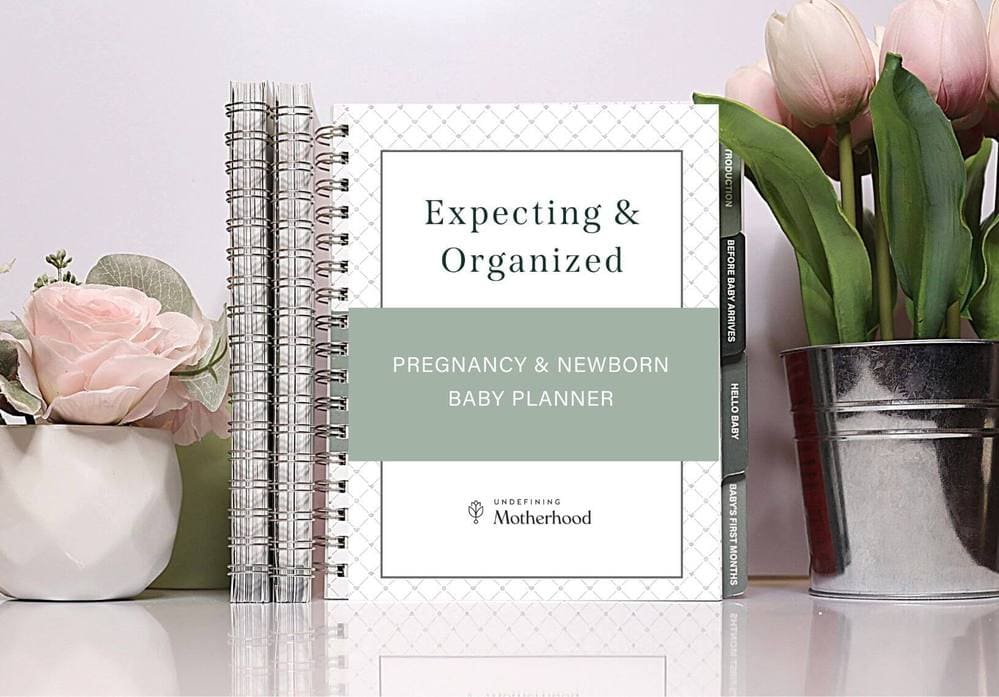When you’re trying to conceive, you want to see those two pink lines more than anything. But for some of us, that positive pregnancy test doesn’t lead to sheer joy, but instead to joy, hope, gratitude… and also tremendous fear and anxiety.
Anxiety in early pregnancy is common, especially for women in my community–most of whom have struggled through infertility and/or pregnancy loss in their quest to have a baby.
For some of us, though, the anxiety is strong enough to interfere with our daily lives, and in some cases, it continues throughout our entire pregnancies.
I’ve spent the past 13 years being treated for anxiety, in addition to being a researcher who helps support families through vulnerable times of trying to conceive, pregnancy, and parenting. And one of the most common questions I receive is this one: “How can I calm my anxiety while pregnant?”
In this article, I’ll tell you what my experience and research has uncovered about the experience of pregnancy anxiety; provide advice for seeking treatment (if needed), and give tips for overcoming the spiraling thoughts that so often interrupt our supposedly joyful perinatal experiences.

This site contains affiliate links, meaning that we earn a small commission for purchases made through our site. We only recommend products we personally use, love, or have thoroughly vetted.
- What Is Pregnancy Anxiety?
- How to Get Support for Anxiety During Pregnancy
- 10 Tips: How to Calm Anxiety While Pregnant
- 1. Talk to your anxious thoughts
- 2. Counter your unwillingness to imagine a positive outcome by leaning in to pregnancy planning
- 3. Exercise to decrease anxiety
- 4. Admit how you’re feeling to others
- 5. Create your own metaphor to explain your emotions to others
- 6. Ask for and accept help
- 7. Establish clear boundaries with family, friends, and colleagues
- 8. Don’t give in to reassurance seeking
- 9. Notice your anxiety triggers
- 10. Become an observer of yourself
- Pregnancy Anxiety FAQ
What Is Pregnancy Anxiety?
In everyday life, we use this phrase to describe two distinctly different experiences:
- Pregnancy worry, which most of us experience, but which doesn’t consume our thoughts or interfere with our daily functioning
- Perinatal anxiety disorder, a diagnosable perinatal mood disorder that may interfere with our lives and/or require help from a therapist or psychiatrist
If you’re experiencing the former–a worry that is bothersome and can be hard to overcome, but that isn’t persistent–you’ll still benefit from our tips for calming anxiety while pregnant.
But if you’re one of the 5-7% of women (some estimates say that perinatal anxiety disorder may occur in as many as 11% of pregnant & postpartum women) who struggle daily with anxiety in pregnancy, then seeking help may be a necessary step.
How is pregnancy anxiety different from postpartum depression (PPD)?
While most of us are familiar with postpartum depression (PPD), we often fail to realize that it’s part of a larger group of perinatal mood and anxiety disorders, often referred to as PMADS. There are tons of other common mental health concerns that can also arise during or after birth, like obsessive-compulsive disorder or post-traumatic stress disorder.
These mental health disorders are recognized as potential pregnancy and postpartum complications by the American College of Obstetricians and Gynecologists, but the good news is, they’re mostly very treatable!
So please don’t worry that you have one and feel guilty, ashamed, or like you need to hide it. You’re FAR from alone in your experience, and there are mental health professionals, professional organizations, and loving survivors like myself who all want to help.
Typical perinatal mood disorders include:
- Perinatal or postpartum depression (PPD)
- Perinatal or postpartum anxiety (PPA)
- Perinatal obsessive-compulsive disorder (PP OCD)
- Postpartum post-traumatic stress disorder (Postpartum PTSD)
- Postpartum psychosis
All of these disorders are distinctly different, despite the fact that certain symptoms overlap. And yet, the only one many of us are familiar with is postpartum depression (PPD).
But it’s essential to realize that most of these disorders can appear either during or after pregnancy, and in many cases, they appear in both. And each deserves different treatment.
How is perinatal anxiety disorder diagnosed?
If you believe you might have perinatal anxiety disorder or any other PMAD, please seek help from a medical care provider.
They can help you identify the correct disorder; many anxiety symptoms, for instance, overlap with depression or OCD symptoms, and knowing where your problem is rooted is key to managing it effectively.
Once you understand exactly what’s going on, then you can work with your care provider to devise the best and safest treatment plan for you, your experiences, your personality, and your body.
The most common way people approach this diagnosis is by talking to their OB or midwife. If this is your only option, then please use it, but if you have access to a perinatal therapist or psychiatrist, we strongly recommend you make use of that resource.
Should I see a mental health specialist?
Only mental health care providers are trained to treat psychiatric disorders, and only perinatal certified providers have the proper training to treat perinatal-specific mood disorders. Often, people who approach their OBGYNs about PMADs are left feeling like they weren’t taken seriously.
In many cases, it’s likely not that the doctor doesn’t care about the patient’s wellbeing, but instead that they don’t necessarily have the resources to treat this particular pregnancy complication.
What they hopefully do have is a list of providers who have successfully supported other moms, so they’re definitely a good resource.
To find a perinatal psychologist or psychiatrist, use the “Find a Provider” tool from Postpartum Support International. If you need a therapist outside of pregnancy and postpartum, check out how to find a therapist.
What are the signs of anxiety in pregnancy?
Symptoms of perinatal anxiety disorder run a wide range, and some overlap with other PMADs, especially depression, OCD, and PTSD.
If at all possible, please seek help instead of trying to diagnose and treat yourself.
But if you’re here, chances are you’re wondering if you need to seek treatment. Although many of the symptoms do align with my personal experience, we only trust professionals when determining what you need to look out for.
We’ve compiled the following list of pregnancy anxiety and postpartum anxiety symptoms from Harvard Medical School, the Center for Women’s Mood Disorders in the Department of Psychology at the University of North Carolina Chapel Hill School of Medicine, and the experts at Postpartum Support International,
Signs of pregnancy anxiety or postpartum anxiety include, but are not limited to:
- Extreme nervousness
- Exaggerated fears or obsessive thoughts about baby’s health
- Racing thoughts
- Disturbed sleep or appetite
- Panic attacks
There are various signs of panic attacks, as well, not just the ones we know best. These include, but are not limited to:
- Rapid heartbeat
- Difficulty breathing
- Hyperventilation
- Dizziness
- Hot flashes
- Nausea
What are the causes of pregnancy anxiety?
There are many different reasons someone might develop perinatal anxiety disorder.
People who’ve experienced pregnancy loss, stillbirth, or fertility trauma are at an increased risk of developing severe anxiety in pregnancy and during postpartum (research published in the Journal of Affective Disorders).
Remember that anxiety in pregnancy can have numerous other causes, as well, including: environmental stressors, hearing about someone else’s traumatic experience, and ever-changing hormones (an especially common culprit for early pregnancy anxiety in the first trimester.)
Other risk factors that can contribute to PMADS
According to the nonprofits Postpartum Support International, Tommy’s.org, and research published in the Journal of Affective Disorders, other risk factors include:
- Personal or family history of anxiety or panic attacks
- History of trauma or abuse
- History of other psychiatric disorders
- History of perinatal mood disorders (PMADs)
- Experiencing high levels of external stress (such as related to work, family, finances, housing, etc.)
- Thyroid imbalances
- Lack of family or partner support
- Unplanned or unwanted pregnancy
Even if you’ve never experienced anxiety before, there is absolutely nothing wrong with you for experiencing it now–it’s okay, it’s not shameful, and there is help.

How to Get Support for Anxiety During Pregnancy
I cannot reiterate enough that you do not have to go through the struggle of pregnancy anxiety alone. There are tons of resources, options, and people who want to help.
Who to talk to
1. Postpartum Support International
The quickest and easiest resource is Postpartum Support International–yes, even if you’re still pregnant! Even if you’re early in pregnancy!
Call or text “Help” 24 hours a day to 1-800-944-4773 (US English speakers). For US Spanish speakers, contact 971-203-7773. Outside of the US? No worries. Visit their website from your home country to access a support number.
2. A Qualified Perinatal Therapist
Click here to locate a qualified healthcare provider online (US & Canada)
3. Your OBGYN or Midwife
You can always reach out to the doctor caring for your pregnancy about the symptoms you’re experiencing. They’re not as directly trained to manage the situation as certified perinatal therapists and psychiatrists, but they should have a general knowledge of options and resources.
If you require prescription medication, they may also be the least expensive way to access it.
Medications
Medications are an especially tricky subject during pregnancy, so a lot of general practitioners and even psychiatrists will not prescribe while you’re pregnant.
But that doesn’t mean there aren’t medication options that are considered safe. More and more maternal fetal medicine specialists (also called perinatologists) are advocating for patients to be allowed to stay on psychiatric medications during pregnancy, and there has been research conducted to determine the safety of certain medications.
For the most educated professionals, look for a perinatal psychiatrist or perinatal psychopharmacologist.
Research from Harvard Medical School reminds us that SSRIs (typically prescribed for depression and anxiety) are often considered safe during pregnancy, and recent research suggests that previous concerns about the use of benzodiazepines (often used to treat anxiety) during pregnancy might be overblown.
It’s important to talk to a qualified healthcare provider who is up-to-date on the most current information, and please remember that this is not all healthcare providers. One cannot be a specialist in every field.
For the sake of reducing the stigma, I will say that, under the guidance of both a perinatologist (also called an MFM) and a perinatal psychiatrist, I personally have taken an SSRI with light use of a benzodiazepine during pregnancy.
That doesn’t mean they’re a good fit for you; but if you’re struggling with the guilt of potentially choosing medication, please know you’re not alone.
How to talk to your doctor
When you approach your doctor, approach them seriously and be prepared to advocate for yourself if need be.
Keep a list of symptoms you’re experiencing as you experience them and take that list to your doctor’s appointment.
Notice the difference between these two conversations you could have with your doctor.
If a patient says, “I’m experiencing a lot of anxiety recently,” the doctor might probe and ask more questions, or they might assure you that pregnancy worry is quite common.
But if you go into the same doctor’s appointment equipped with information, they’ll be much more likely to take your concerns as seriously as you deserve.
Imagine if a patient instead says, “I’m experiencing extreme worry about whether my baby is okay. It’s keeping me awake at night, and I sometimes awaken from nightmares about the baby’s safety. I’m also experiencing episodes of a racing heart, dizziness, and sweating that I believe might be anxiety-related.”
The more information you equip your doctor with, the more that doctor will be able to support you. And if, for any reason, you don’t receive the support you believe you deserve, push harder and get more specific.
While we do not support pushing a care provider to prescribe medication that they understand best, we highly encourage you to recognize your rights as a patient and to push for your care providers to hear your concerns and take them seriously.
10 Tips: How to Calm Anxiety While Pregnant
Whether you’re seeking medical care or taking medication, it’s essential to take proactive steps to improve your own mental health and manage your own anxiety. The following are tips I have personally used to help me overcome severe perinatal anxiety, based on my experiences in therapy, especially using approaches based on Cognitive Behavioral Therapy (CBT) and Acceptance Commitment Therapy (ACT).
1. Talk to your anxious thoughts
Are you giving me side-eye for this one? Trust me; I get it. I used to think this sounded ridiculous. Until I tried it and learned the power it really has.
When your thoughts start spiraling, try to understand why they’re there. Then, ask yourself a question: can I take any action that will be effective in helping with this problem?
Then, talk to your thought. Thank it for coming. Recognize it’s there to try to protect you. Tell it what you’re going to do to take action (if anything).
Then, say, “Now there’s nothing effective left to do, so I’m going to release you. I understand you may visit again, and we can repeat this conversation when you do.” Then imagine it floating away.
Yes, it will come back. When it does, imagine that it floated back to you, and repeat the process.
Example
I constantly worry about whether my baby is safe inside me. At 29 weeks, I still have this thought regularly.
Let’s say she’s been moving regularly, but I have spiraling thoughts that she’s not okay because she hadn’t moved by 9 am, despite moving normally the night before. (Movements in the morning are not regular at this point, but at night they always are.)
When I start worrying that baby is not okay, I ask myself what I can do that will be effective. I have tons of thoughts—use the doppler, call my OB, go to labor & delivery for a non-stress test.
But because I have no reason to worry (she moved regularly last night, which is her usual time, after all), none of these things will effectively impact the actual situation.
Keep in mind that my goal is not to impact the imagined situation. If she had decreased movement, calling my doctor and going to L&D WOULD be effective actions to help solve the problem. But that’s not the situation.
The real situation is that this is a normal morning, but my thoughts are spiraling, and I’m panicking. I don’t tell myself this isn’t rational—what’s rational doesn’t matter to anxiety. I simply remind myself of the real situation so I can choose my action.
Because I know using a doppler is not helpful for me (more on that later), the only action I can take to help the actual situation is to count kicks later that evening.
So I tell my thought:
“Thank you for visiting me. I understand you’re here to protect me, to guard my heart if something goes wrong, and to protect my baby if something happens that I could notice. But that’s not the situation right now. Right now, all signs point to everything being fine, but still, I am putting it in my calendar to kick count tonight to ensure baby is safe. Thank you for keeping me vigilant. I’m releasing you now, but I’m sure you’ll return soon. If so, I’ll see you then.”
I know it sounds over-the-top, but combining these conversations and actions with the visualization of the thought floating away means that, for me, the thought significantly lessens over time—both in regularity and intensity.
2. Counter your unwillingness to imagine a positive outcome by leaning in to pregnancy planning
If part of your anxiety is fear about your baby’s health and wellbeing, you may find it difficult to plan for your little one’s arrival. This is how I felt during my pregnancy with my son, Jack. I was so consumed by fear that he would never come home safely that I wouldn’t allow myself to do much to prepare for his arrival.
As a result, I perpetuated many of my fears even when the odds were VERY strongly in my favor. I also robbed myself of any chance at a positive pregnancy or postpartum experience.
This is what led me to create Expecting & Organized, a pregnancy and baby planner that helps you do all the planning you need to do–including what you don’t know you need to do–without the crippling anxiety that comes with researching too many details.

How careful planning works to alleviate anxiety
But I’ve also found that careful planning if used wisely, can often work to decrease feelings of anxiety. During my next pregnancy, I was again terrified to plan, but I was working hard with two different therapists to try to allow myself to enjoy my pregnancy like I deserved.
After experiencing horrible nightmares of my baby’s death and fixating on what felt like the inevitable possibility of stillbirth, I decided to lean into planning and see if I could use that strategy to counter my anxiety. But I knew I could only focus on aspects of planning that felt relieving to me.
For many parents, this experience comes through choosing cute baby clothes, decorating a nursery, nesting, and/or helping to plan a baby shower. I knew specifically that I couldn’t focus on safety products because it would feed my fears about the worst happening.
So I pulled out my Expecting & Organized planner (yes, I use my own planner) and flipped through the pages to determine what I wanted to invest my energy into. I chose clothing and the nursery.
Throughout that pregnancy, I did everything else according to the planner without stressing myself over the details. But when anxiety began to surface, I leaned into either nursery decorating and organizing, or getting cute baby clothes ready.
Every time, I felt more connected with my baby and less afraid of a bad outcome.
(Please watch your reactions when you do this. If you find that planning is increasing your anxiety, ask others to help check the boxes on your planner so you don’t exacerbate your anxiety.)

3. Exercise to decrease anxiety
It’s generally considered safe to engage in physical activity while pregnant, but consult your doctor to get specific guidelines tailored to your unique pregnancy. But in terms of anxiety, exercise can make a huge difference.
When we experience fear or anxiety, our bodies produce adrenaline and cortisol. According to an article published by the Institute for Equality and Efficiency in Healthcare, “In generalized anxiety disorder, this state of physical alertness tends to last much longer.” But exercise can help by decreasing the levels of adrenaline in our systems.
An article by Harvard Medical School sums it up best: “The mental benefits of aerobic exercise have a neurochemical basis. Exercise reduces levels of the body’s stress hormones, such as adrenaline and cortisol.”
The most effective time to exercise is when you’re actively feeling anxious because your adrenaline and cortisol levels are likely already high, and exercise will help you release them.
But if this doesn’t fit into your lifestyle, exercising multiple times weekly can still decrease overall adrenaline and cortisol levels. What’s not to love about that?
4. Admit how you’re feeling to others
Did you know that keeping your fears or experiences secret can exacerbate your emotions? I only want you to be as open about what you’re experiencing as you’re going to be comfortable with, but I also want to encourage you to share as appropriate.
When I started having panic attacks, I was mortified and didn’t want anyone to know. But the reality was that I couldn’t hide them, so I developed an unhealthy fear of social situations because I was afraid I’d have a panic attack in front of people who didn’t understand.
I didn’t immediately jump on social media and share that I was panicking, but I did confide in my closest friends and family members. I told them what I was experiencing and that I had begun therapy and using medication, but that it was a very hard time and to please give me grace if I wasn’t my usual self.
As a result, I actually saw my panic attacks decrease both in number and severity. It turns out the constant fear of panic led to significantly more panic.
5. Create your own metaphor to explain your emotions to others
People who haven’t been in your shoes likely don’t understand, and if I’m being honest, that makes your life a lot harder. But if someone is important to have in your life during this time, find a metaphor to help them understand how you’re feeling.
Think of it this way. Anxiety is an abstract concept, so if someone hasn’t experienced it, it can be hard for them to understand. By explaining your emotions through an example they can imagine in more concrete terms, you’ll not only help them understand, but you’ll also help them support you.
Example
For my family, this metaphor is football. You can read about the entire metaphor in-depth in our articles on dealing with pregnancy after miscarriage, but I’ll give you the short gist in an example here.
When I’m pregnant, I take it one step at a time. I’m usually not comfortable looking beyond the next ultrasound or major milestone. So I used football as a metaphor to explain this during my pregnancy with Jack.
A healthy, crying baby–that was the end zone. That was my touchdown. Everything up to that point was just a step toward hopefully getting there. Good test results were a first down. Smaller victories were good plays where we gained some yardage.
But until I was in the end zone, I wasn’t ready to celebrate, and I never wanted to look beyond the next play.
As people who love football, this metaphor made it easy for my family to support me through pregnancy. My mom even asked me after a few doctor’s appointments, “What play was this?” so she could react in a way that would comfort me instead of with the overt joy she always managed to feel.
6. Ask for and accept help
You know all that talk about how mamas can “do it all”? Trash it. Right now. Getting rid of such notions will do you good not only now, but for the rest of your life, mama.
That’s not to say you shouldn’t do what you want to and are able to.
But our society loves to perpetuate the idea that we can be the best parents, the best employees, the most healthy, the most physically fit, the best at finances, good at caring for our families, good children, friends, siblings, the most artistic–all of it at once. It’s MADNESS.
Just like you’d tell your preschool mom friend that it’s okay not to be the Pinterest mom if that’s not her strength, I’m telling you that it will benefit you to figure out what you can most reasonably do less of. Then, ask for help, and ACCEPT it.
This looks different for everyone. It could mean asking your partner to do the grocery shopping, or your mom to cook you a meal each week. For some, it’s hiring help. For others, it’s ordering pizza to the door.
Whatever help looks like for your family, your finances, and your village, please gift it to yourself!
Remember that external stress is one of the major risk factors for perinatal anxiety, so if you can lessen your stress in other areas of your life by delegating at work and not being responsible for every dinner, it will help your anxiety, as well.
7. Establish clear boundaries with family, friends, and colleagues
Setting boundaries with important people in your life is HARD, but it’s also incredibly empowering and can do a lot to mitigate your anxiety.
How many people do you know who are anxious over whether their in-laws will try to take over when the baby is born? Or who are hurt by people they love who react badly to their pregnancy experience?
These issues are so common, and the best way we can deal with them is by setting good boundaries.
Example
If you have pregnancy anxiety, for instance, there might be people in your life who find your anxiety to be inconvenient. They might say that worrying is normal, you’re being dramatic, or perhaps worst of all, that you’re just seeking attention.
The best thing you can do with such people is set boundaries:
- What will you accept from them?
- What will you not put up with?
- What consequences will they face for overstepping your boundaries?
We have an expert training exercise on boundary setting during pregnancy in our private membership group for expecting mamas, Undefining Pregnancy.

For other resources on boundary setting, I recommend the book Set Boundaries, Find Peace by Nedra Glover Tawwab, along with the accompanying workbook.
Tawwab is a licensed counselor and relationship expert whose advice has created more than a million adoring fans on Instagram and for good reason. I’m confident this book will help you if you struggle with boundary setting.
8. Don’t give in to reassurance seeking
Do you do certain things because they give you reassurance and temporarily lessen your anxiety?
In very early pregnancy, this often manifests as repeatedly peeing on a stick to watch the lines (hopefully) get darker. Later, it could involve using a fetal doppler, calling your doctor, or probing your baby to kick.
None of these actions are necessarily bad–to the contrary, if you have a concern, it’s important to call your doctor.
But if you’re engaging in these activities for the sole purpose of reassuring yourself against anxiety that’s unfounded in rationality, that’s when you risk creating a negative spiral that makes your anxiety worse.
An Example
When I was pregnant with my now preschool-aged son, I constantly worried that his heart had stopped beating. The best relief I found was in my doppler, where I could search for his heartbeat, hear it, and feel calmer.
But when I began observing my actions and emotions, here’s what I noticed. I would get anxious that Jack was no longer alive, so I’d pull out my doppler. I’d find his heartbeat and feel instant relief. Great, right?
But there’s a BIG BUT here. I noticed that the intervals between my episodes of extreme anxiety got shorter and shorter, and I eventually realized that the doppler was making things WORSE, not better.
You see, the doppler made me feel better immediately, so it seemed like an effective tool, but I was actually leaning on it as a crutch. The more I used my doppler, the more I worried that Jack’s heart had stopped.
Learn more about this anxious feedback loop in my article about coping with pregnancy anxiety after loss.
So I had to put rules around doppler use to make it work for me. Once I did, my general anxiety began to lessen, and over time, I had far less anxiety that his heart was no longer beating. But without writing down what was happening, it would’ve been very hard to see this pattern, and I’d have likely leaned into the doppler more and become even more anxious.
In Summary
Let me sum this one up with a short example of when you may and may not be feeding your anxiety.
If you are worried about your baby because they aren’t moving and kicking according to their usual rhythms, please contact your doctor immediately. There’s nothing wrong with a trip to labor & delivery to check on your baby when you notice a change–in fact, it should be encouraged!
But if you’re worried because you haven’t felt baby kick today–and baby has never kicked at this time of day–try waiting a few hours until they normally kick.
Or drink a glass of something cold and lie down on your side to see what you can feel. But immediately reaching for a doppler or rushing to L&D when there’s not a rational cause for concern might be exacerbating the anxiety you want to improve.

9. Notice your anxiety triggers
Pay attention to the different activities or thoughts that trigger your anxiety most often. Then, devise a plan to deal with them.
For example, Melissa, a member of our community, noticed that she got extremely anxious the longer she went between doctor’s appointments. A good solution was that she asked her doctor if she could come in for more frequent appointments. Each week, she showed up for a quick doppler appointment, and she noticed that her anxiety greatly lessened.
For me, on the other hand, this would have the opposite effect because my trigger is different. I am triggered by OB appointments, especially ultrasounds. As such, if I were to go in weekly, I would feel panic for 1-2 days before the appointment every single week. So this tactic would hurt me, not help me.
At quick glance, Melissa and I were experiencing the same thing–panic between doctor’s appointments. But the triggers were different, which meant the solutions had to be, as well. Melissa asked for more appointments, which helped her, whereas I asked my OB for only the appointments that were absolutely necessary, which helped me.
Knowing your specific triggers makes such a huge difference.
10. Become an observer of yourself
Imagine you’re able to sit out-of-body, above yourself, observing your actions, thoughts, emotions. Ghost-of-Christmas-Past style.
You start feeling anxious–what do you do? And just as importantly, how do you feel when you do it?
I suggest writing down the thought that’s causing you stress (and if there’s no clear thought, then write that down, as well.) Then, write down your physical response–what you actively do next. Finally, notice how you feel in the immediate moments, few minutes, and hours after those activities. If possible, write that down as well.
What we’re looking for is patterns that increase your anxiety.
If not for observing my behaviors and emotions, how would I have known that my doppler was hurting me and not helping? How would I have known that more frequent doctor’s appointments would not help me like it helped Melissa? How would Melissa have known to ask for more appointments?
This is one reason journaling, or using a pregnancy journal, can be so helpful.
The most powerful thing you can do for anxiety is observe your thoughts and actions, as opposed to feeling trapped by them.
Pregnancy Anxiety FAQ
To calm anxiety while pregnant, try incorporating aerobic exercise at least 3 days a week, and set good boundaries with family, friends, your partner, and work.
Pregnancy hormones impact so many different systems in our bodies, and they can increase anxiety, especially in the first trimester. But pregnancy can also be a very anxious state because so much is changing, yet out of our control. It’s possible your anxiety isn’t being caused by hormones, but by all the life changes, and that’s just as fair.
While excessive anxiety can impact pregnancy in various ways, please remember that women regularly survive trauma and still carry healthy pregnancies. It’s best for baby to try to keep your stress hormones as regulated as possible, just like you want all your hormones to be as regulated as possible. But please never think you experienced a miscarriage because you couldn’t just relax.
What’s your favorite tool to help calm anxiety while pregnant?












